Welcome back to This Week in Apps, the weekly TechCrunch series that recaps the latest in mobile OS news, mobile applications and the overall app economy.
The app industry continues to grow, with a record number of downloads and consumer spending across both the iOS and Google Play stores combined in 2021, according to the latest year-end reports. Global spending across iOS, Google Play and third-party Android app stores in China grew 19% in 2021 to reach $170 billion. Downloads of apps also grew by 5%, reaching 230 billion in 2021, and mobile ad spend grew 23% year over year to reach $295 billion.
Today’s consumers now spend more time in apps than ever before — even topping the time they spend watching TV, in some cases. The average American watches 3.1 hours of TV per day, for example, but in 2021, they spent 4.1 hours on their mobile device. And they’re not even the world’s heaviest mobile users. In markets like Brazil, Indonesia and South Korea, users surpassed five hours per day in mobile apps in 2021.
Apps aren’t just a way to pass idle hours, either. They can grow to become huge businesses. In 2021, 233 apps and games generated over $100 million in consumer spend, and 13 topped $1 billion in revenue. This was up 20% from 2020, when 193 apps and games topped $100 million in annual consumer spend, and just eight apps topped $1 billion.
This Week in Apps offers a way to keep up with this fast-moving industry in one place, with the latest from the world of apps, including news, updates, startup fundings, mergers and acquisitions, and suggestions about new apps to try, too.
Do you want This Week in Apps in your inbox every Saturday? Sign up here: techcrunch.com/newsletters
Web3 apps are growing
Image Credits: Apptopia
A report from Apptopia has found the number of mobile applications describing themselves as “web3” apps has continued to grow from 2020 through 2022. So far this year, the number of web3 apps available for download is growing nearly 5x faster compared with 2021, and year-to-date, the number of apps available for download is up by 88%.
The firm analyzed data across the App Store and Google play, looking for any apps with “web3” in the title, subtitle or app description. Many of these apps — around 46% — were those in the finance space. This has to do with the large number of mobile wallets, NFT apps and the like now crowding the app stores. Much smaller percentages were found in apps in the social, tools/utilities, business and gaming categories.
However, despite the growth in the availability of web3 apps, the number of downloads the apps are seeing seems to ebb and flow, Apptopia noted. In addition, it found that NFT marketplace apps OpenSea and Veve were down 90%+ off their highs, and the top 50 crypto apps have seen downloads fall 64% since November. Meanwhile, web3 apps seeing growth currently include the circular economy app Twig and running app STEPN, which lets users collect NFTs by running outdoors.
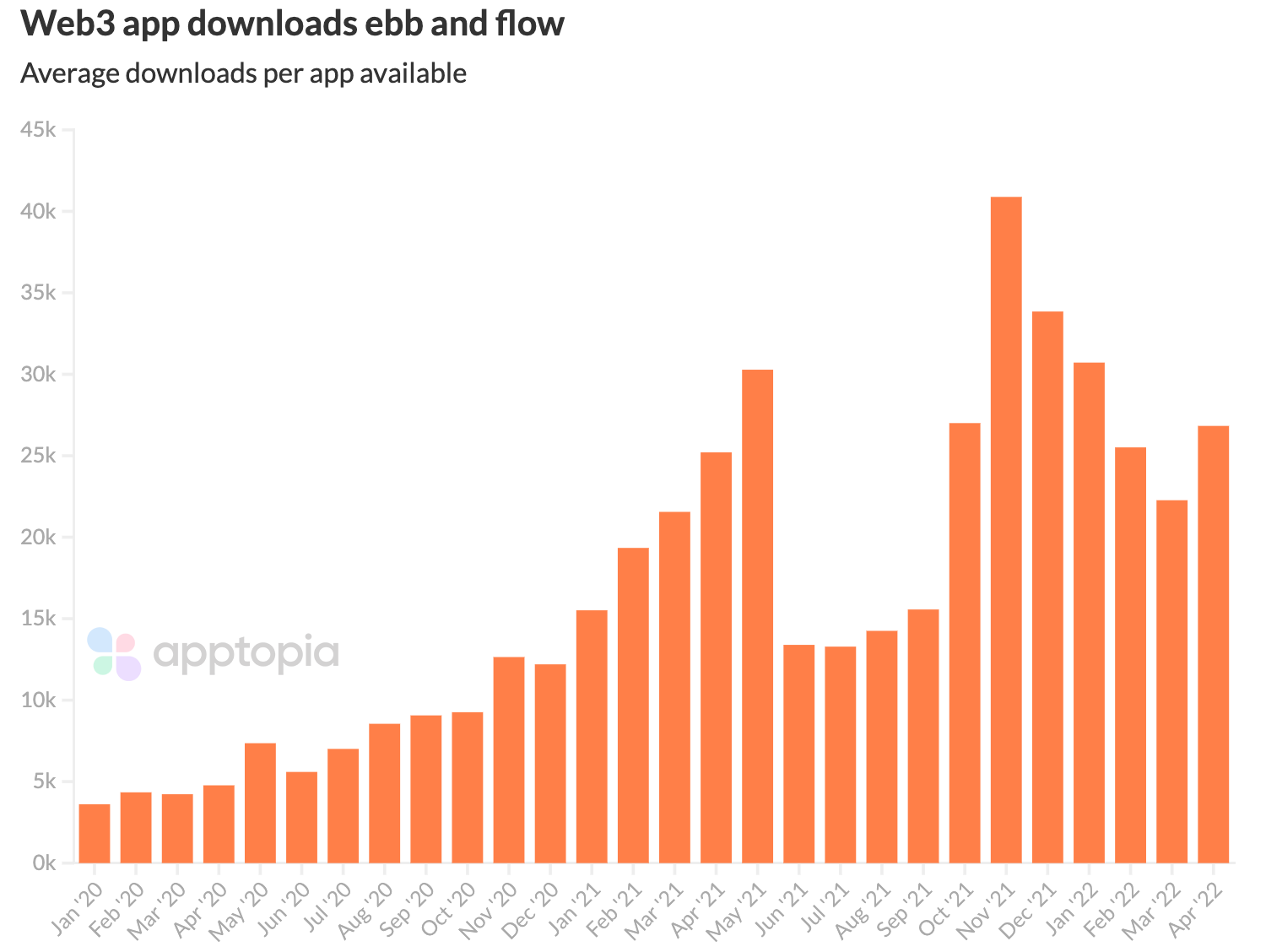
Never-ending Twitter deal drama
In what’s becoming a regular occurrence, it was another tumultuous week for the deal that would see Elon Musk acquire Twitter.
This week, Musk decided to put up more of his own money for Twitter — just days after it looked like the tech exec was trying to get out of the deal by alleging Twitter lied about the percentage of bots on the platform. In a filing, Musk said his personal financial commitment was now $33.5 billion, up from $27.25 billion. The Telsa and SpaceX exec had previously said he would execute a margin loan of $12.5 billion against his other holdings, like his Tesla shares. But Tesla shares had seen a sharp decline after news of Musk’s acquisition plans for Twitter back in April, potentially prompting this move.
If you’re sick of all the deal shenanigans, you’re not alone. A group of Twitter shareholders has now sued Musk, alleging he manipulated Twitter stock for his own benefit throughout the course of buying the company.
The suit says Musk’s complaint about the percentage of bots on the platform was likely an attempt to drive down the price of the deal. It also cites issues with how he claimed the deal was “on hold,” when there was no such mechanism in place to stop the deal from proceeding; and it points out that Musk delayed filing a disclosure when his stake in the company exceeded 5%, allowing him to buy shares at a discount, in violation of securities law.
While a select group of Twitter investors is behind the lawsuit, it’s open to any shareholders who are looking to receive financial compensation from the Twitter chaos the deal has caused.
Musk’s move to buy Twitter is certainly shaking things up. This week former Twitter CEO Jack Dorsey exited the board of directors. And, at Wednesday’s shareholder meeting, the board voted to oust board member — and Musk ally — Egon Durban, CEO of private equity firm Silver Lake. Durban has backed Musk’s companies, including SolarCity, before it was acquired by Tesla. The FT pointed out that the two biggest shareholder advisers, Institutional Shareholder Services and Glass Lewis, cited concerns with Durban serving on too many other boards. (The FT said he was on seven this year, but a Twitter SEC filing said it was six.)
Twitter then rejected Durban’s resignation, two days after shareholders had blocked his re-election. The company said that Durban likely failed to receive shareholder support because of his director role on so many other boards (six), but Durban had agreed to reduce the number to five by May 25, 2023.
Also during the shareholder meeting, Twitter CEO Parag Agrawal faced a number of questions about the deal, what it means for free speech on Twitter, content moderation and other issues. But Twitter declined to answer questions about the deal and said work at Twitter was continuing as usual. (Which hardly seems true, given the string of firings and exec departures following Dorsey’s exit and Musk’s takeover attempt!).
Twitter’s troubles also extended beyond the acquisition, as this week Twitter also agreed to pay a $150 million fine as part of its settlement with regulators over user data privacy. The FTC and Department of Justice said that between May 2013 and September 2019, Twitter asked users for personal information — including phone numbers and emails — to secure their accounts, but then used that information to target users with ads. More than 140 million Twitter users were impacted, the FTC said.
Platforms: Apple
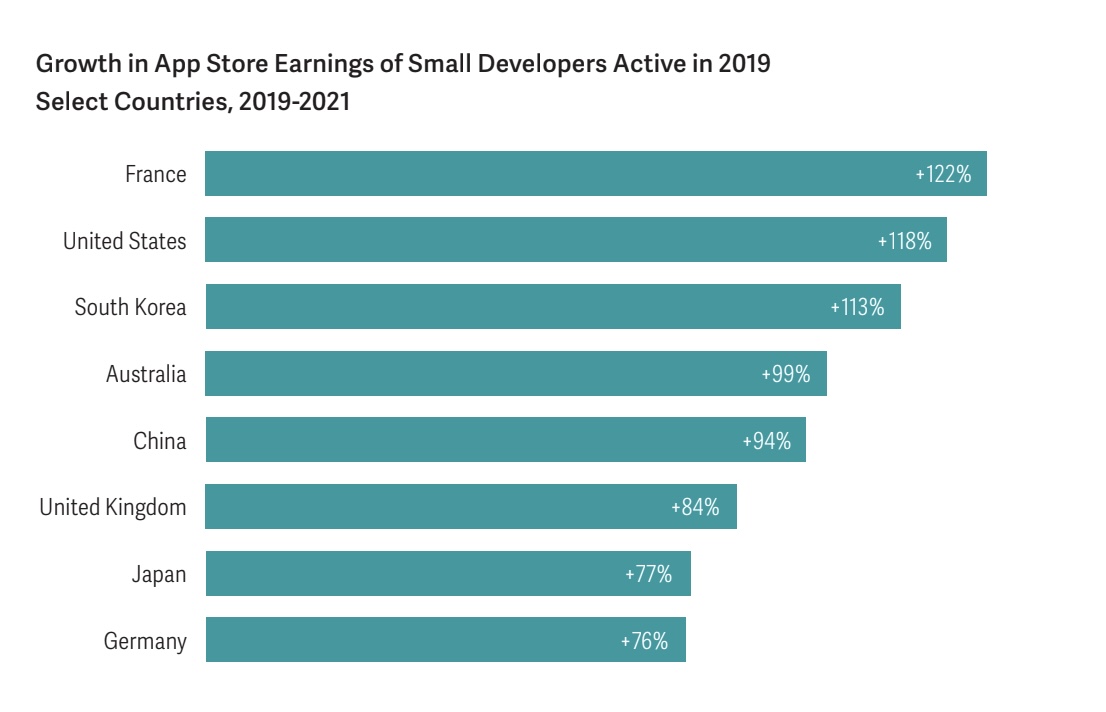
Image Credits: Apple
- Apple’s latest research suggested the iOS app economy supports 2.2 million U.S. jobs. Apple shared two more new research reports this week, both of which were meant to demonstrate how successful the app economy has been under its reign. The company commissioned two outside firms to produce analysis related to job growth and earnings in the iOS developer community. Apple said revenue for small developers on the App Store in 2019 increased by 113% over the past two years, outpacing the earnings growth of larger developers by more than 2x. In the U.S., smaller developers saw a 118% increase in earnings since 2019. It defined small developers as having under $1 million in billions and fewer than 1 million downloads.
- Apple informed developers that starting on June 30, 2022, all App Store apps that offer account creation must also offer an in-app option to allow their users to delete their accounts. The deadline had been pushed a couple of times previously, and takes particular aim at many of Apple’s rivals, like Facebook or Match, which offer cumbersome and obfuscated processes for account deletions.
- Apple released iOS 15.5.1 with iPhone-to-iPhone contactless payments.
Platforms: Google
- Google’s automated enforcement of its Play Store policies has angered the developer of email app FairEmail, which has over 500,000 downloads. The app was flagged as spyware because it uploads user contacts, although the real issue could be something else and the wording in Google’s response wasn’t clear. Fed up, the developer said he was going to stop working on his apps altogether. After press coverage, however, he was able to talk to Google by phone and the app is being restored.
E-commerce
- EBay launched its first collection of NFTs in partnership with web3 platform OneOf. Its new “Genesis” NFT Collection features 3D and animated interpretations of athletes featured on Sports Illustrated covers over the years.
- Instacart revamped its ratings. The shopping app’s new customer ratings system aims to address shopper complaints about customers who continually abuse the system unfairly. Instacart says it will now remove ratings from customers who consistently rate their shoppers below five (5) stars. Instacart is also going to forgive ratings for reasons that may be outside of a shopper’s control and will allow shoppers to block rude customers so they won’t be paired with them again. And when customers remove tips without reporting problems, Instacart will pay out at least $10. The shoppers’ app will also now show a “Your Stats” screen with details like their average customer rating, customer feedback and statistics, like how many orders they’ve completed. Shoppers have to keep a 4.7 star rating to get prioritized for batches.
Augmented Reality
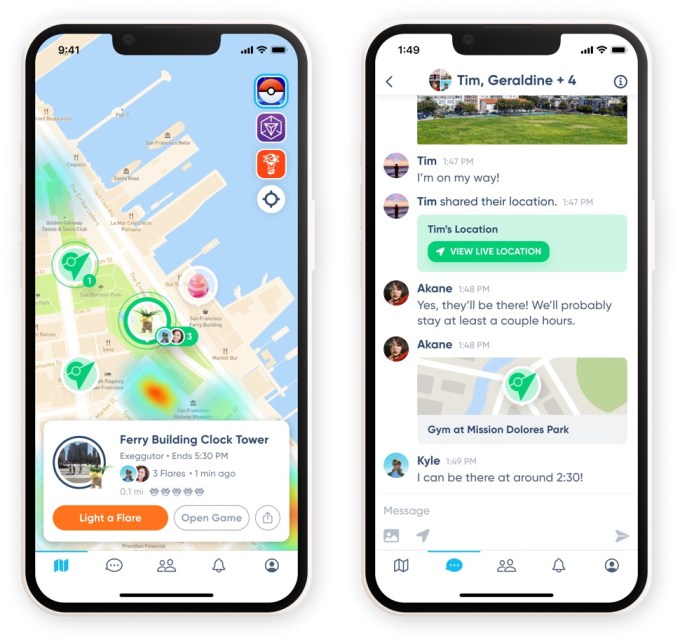
Image Credits: Niantic
- At its Lightship AR developer conference, Niantic unveiled Campfire, a social app for the “real-world metaverse” that helps Niantic gamers discover new people, places and experiences across the company’s apps.
- Niantic also introduced other AR developments at its event, most notably, its new Lightship Visual Positioning System (VPS) — a way for developers to determine the position and orientation of users and anchor AR content. The company has been quietly building out VPS, and there are now more than 30,000 VPS-activated public locations already available — most of which are in San Francisco, London, Tokyo, LA, New York and Seattle. Plus, its WebAR development platform 8th Wall added a new pricing tier for creators.
- Niantic also revealed its investment in Pixelynx, makers of a mobile game called Elynxir from musicians deadmau5 and Plastikman, which is like a music-filled take on AR games like Niantic’s own Pokémon GO. It also backed XR wellness app Tripp, a VPS partner.
- As part of Snap’s partnership with Live Nation, the Snapchat maker teamed up with Insomniac Events to bring Snap’s technology to Electric Daisy Carnival Las Vegas. The event brings festival-goers four new EDC Snapchat Lenses, including a Night Owl Lens; Daily Lens; AR Compass; and a Friend FindAR Lens (beta). The latter works to help users find their friends if everyone has location-sharing enabled.

Image Credits: Snap
Fintech
- PayPal laid off 83 employees from its San Jose headquarters around a week before the company said it was closing its San Francisco office. The company didn’t offer further details, but said it remains committed to the Bay Area and will continue to hire.
- Apple’s new “Tap to Pay” contactless payments feature rolled out to Apple Stores nationwide. The feature allows users to make a payment without any extra hardware involved.
Social
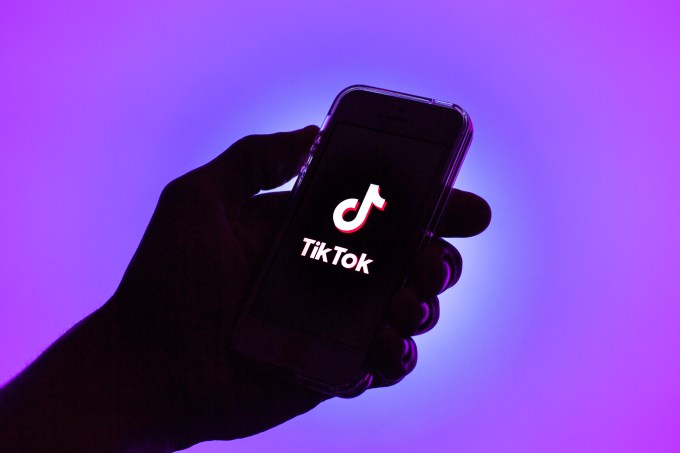
Image Credits: TikTok
- TikTok ramped up its competition with Twitch, YouTube and others with the launch of TikTok LIVE subscriptions, a new program that will allow creators to generate recurring revenue via payments from their top fans. Similar to the offerings from rival streaming sites, the new service will offer subscribers a range of perks, including subscriber-only chat, custom emotes, badges and more. Based on early reports, the subscriptions cost $5.99/mo and involves a 50/50 rev share, though that could still change.
- Snapchat’s Family Center parental controls were spotted under development. The feature will allow parents to see who their teen is friends with on the app as well as who they’ve been messaging with over the past seven days, and more. However, it won’t give parents insight into what teens are saying in messages or posting to their own accounts, or allow them to restrict access to various parts of the Snapchat experience.
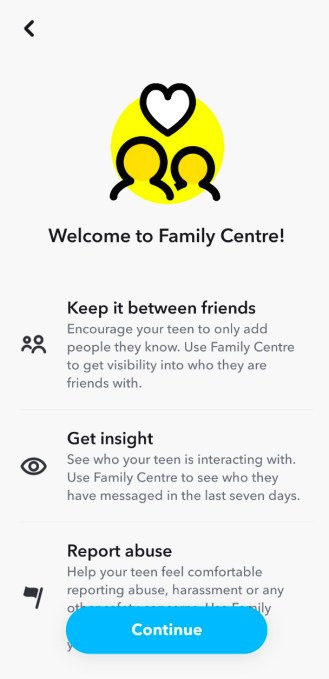
Image Credits: Snapchat screenshot via Watchful
- Snap’s CEO Evan Spiegel warned employees this week that the company would miss its Q2 revenue and earnings targets as its growth had weakened. The company said it would slow hiring, as well. Snap cited the overall economic environment as contributing to the slowdown, including inflation and the Russia-Ukraine war. It also suggested the iOS privacy change continues to impact the company’s revenues. The stock tanked as a result.
- Twitter updated its API (v2) to give third-party app developers the ability to access the same reverse chronological timeline that’s available today in Twitter’s own app.
- Instagram gave its app a visual refresh with a brighter logo, typeface (“Instagram Sans,” inspired by its logo and its “squircles”) and full-screen marketing layouts. The new logo’s gradient, meanwhile, is meant to be more vibrant and features a touch of blueish-purple, likely meant to recall the app’s connection to Facebook.
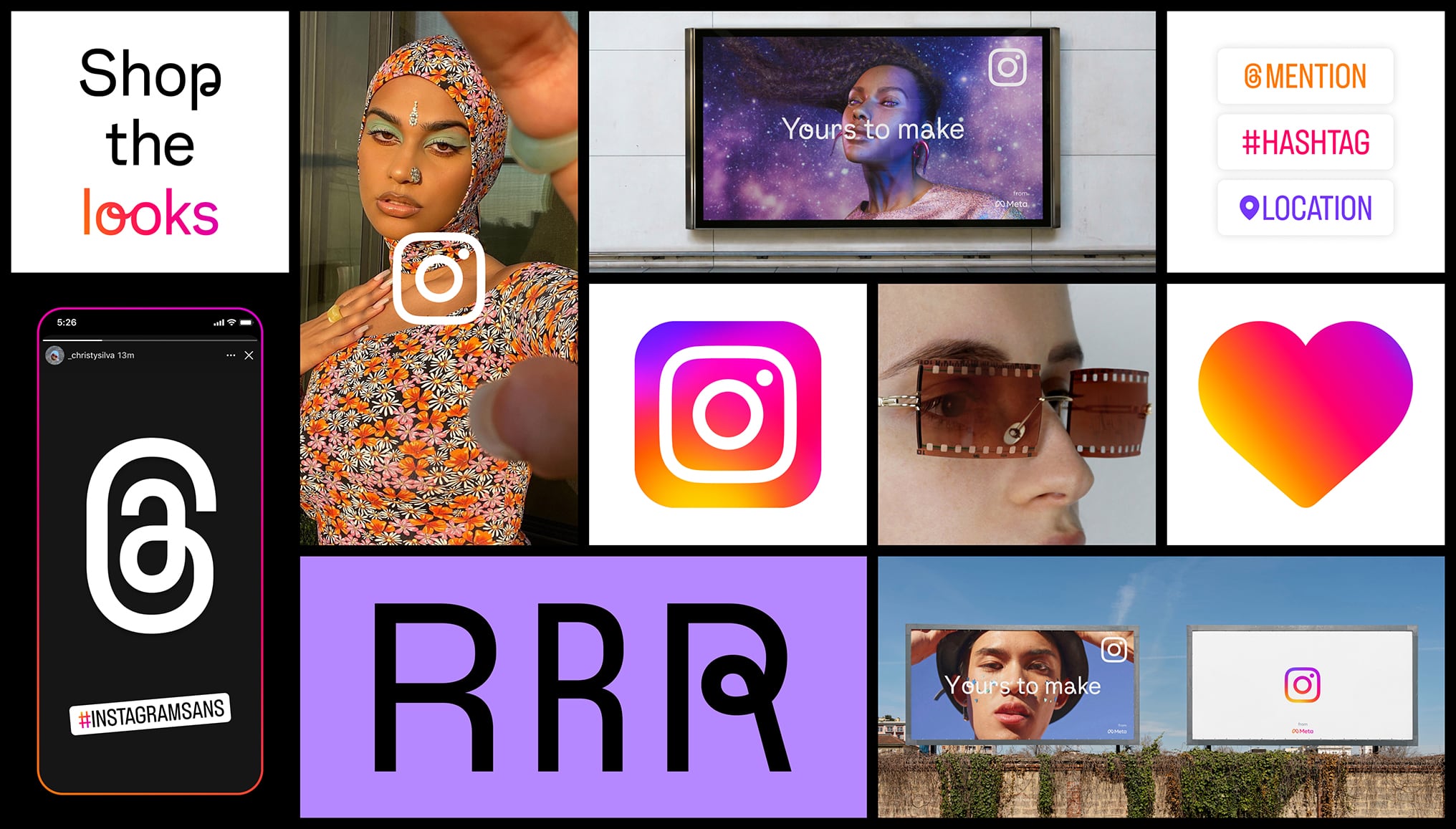
Image Credits: Instagram
- A Rest of World case study of India’s Koo, a Twitter alternative, highlights the potential pitfalls with the introduction of a self-verification system (as Elon Musk wants for Twitter). In Koo’s case, the system is technically optional, but leverages Aadhaar — a verification system that’s supposed to be voluntary but had proved to be otherwise. Those without Aadhaar verification had not been able to access services like mobile connections, education, banking and pensions.
- YouTube Shorts began rolling out ads globally. The TikTok rival had been experimenting with ads since last year, and now offers both video action campaigns and app campaign ads.
- ByteDance rival Kuaishou, maker of China’s second-largest short video platform, reported Q1 revenue up 24% year-over-year to ~$3.2 billion, versus ~$3.1 billion estimated, and a ~$939 million net loss, down 89% year-over-year from ~$8.7 billion. The company now has 346 million DAUs, up 17% from 295 million a year ago.
- TikTok extended its Marketing Partner Program to allow marketers to manage their TikTok accounts without leaving their third-party content marketing platforms. The short-form video app is partnering with Sprout Social, Hootsuite, Sprinklr, Emplifi, Dash Hudson, Khoros, Brandwatch and Later for the initial launch.
Messaging
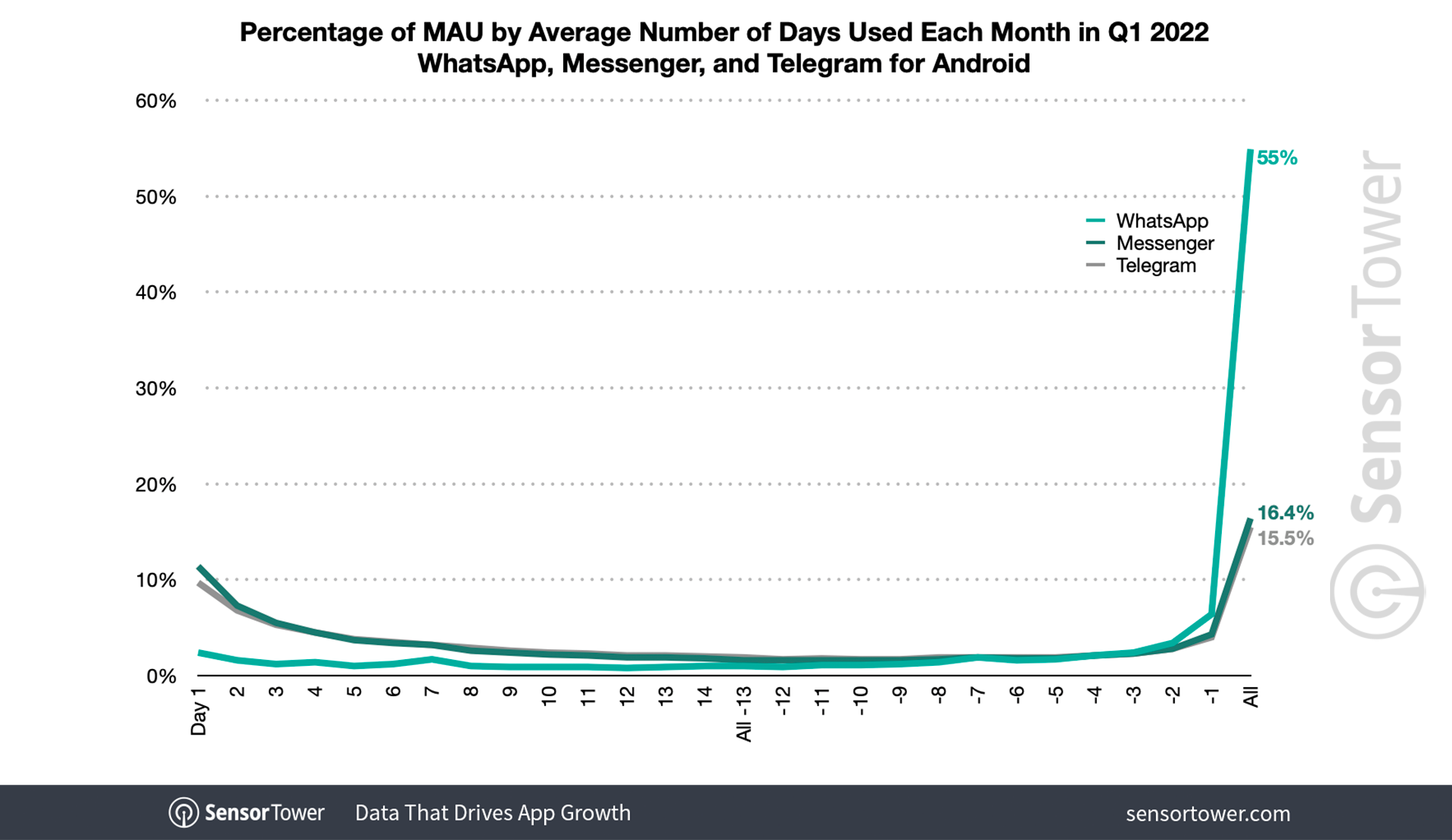
Image Credits: Sensor Tower
- New data indicates more than half (55%) of WhatsApp’s audience is using the app every day, up from 39% a year ago, per Sensor Tower. The firm found that both WhatsApp and Telegram saw a spike in engagement by MAUs in February due to Russia’s invasion of Ukraine. In Q1 2022, Telegram saw 15.5% of its MAUs open the app each day, up from 9% in Q1 2021.
- WhatsApp said it will no longer work with iPhones running iOS 10 and iOS 11 starting later this year, as it aims to focus development only on newer versions of Apple’s mobile operating system.
Photos
- Google Photos began rolling out its new “Real Tone” filters on Android, iOS and the web this week. The filters are found in the Filters tab in Google Photos’ image editor and were designed by professional image-makers to work across skin tones.
Dating
- Bumble is preparing to expand further into social networking with a new communities feature inside its flagship dating app. The feature will be a part of its BFF offering and is already in alpha testing, the company said. Many of the communities are female-focused, with social groups that allow women to chat about topics like student life, mentoring, parenting, work and more.
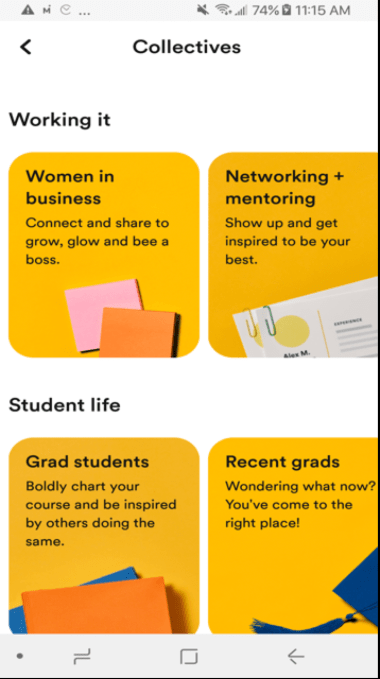
Image Credits: Bumble screenshot via Watchful
Streaming & Entertainment
- Spotify is again hosting political ads on podcasts after pausing them in early 2020, as it says it has strengthened its advertiser verification system.
- Spotify also said its new “call-to-action” clickable ads were expanding to Australia, Canada and the U.K., after their U.S. launch in January. The ads display during a podcast’s ad break and can later be located on the podcast’s page.
- Apple Music became available in Google’s navigation app, Waze, which had already supported rival Spotify, Audible and other streaming services.
Gaming

Image Credits: data.ai
- Data.ai (formerly App Annie) released a new games report with IDC, which found that mobile gaming is poised to take over 60% of the market share in 2022 — 3.2x the size of the next largest form factor, console gaming. The mobile gaming market itself will top $136 billion in 2022. Mobile gaming reaches a wide demographic, it found, with 47% of the top 1,000 grossing mobile games skewing toward Gen Z in the U.S., while the Gen X and Baby Boomer generations, combined, was the fastest group for mobile game spending. U.S. mobile gamers also generally prefer to see ads in exchange for free content by a 3:1 margin.
- Roblox hired former Zynga CTO Nick Tornow as its new VP of Engineering. Tornow will help to shape the platform for its 50 million daily active users, including in areas like real-time translation, and other areas.
- Sony said it will shift more than half (55%) of its development budget to its live game service over the next three users, aided by Sony Interactive Entertainment’s acquisition of Destiny maker Bungie for $3.6 billion. The company will leverage Bungie’s expertise to build out a portfolio of 12 live game service franchises by its 2025 fiscal year, up from one in 2021, it told investors. It also forecast significant growth of PC and mobile games within its portfolio.
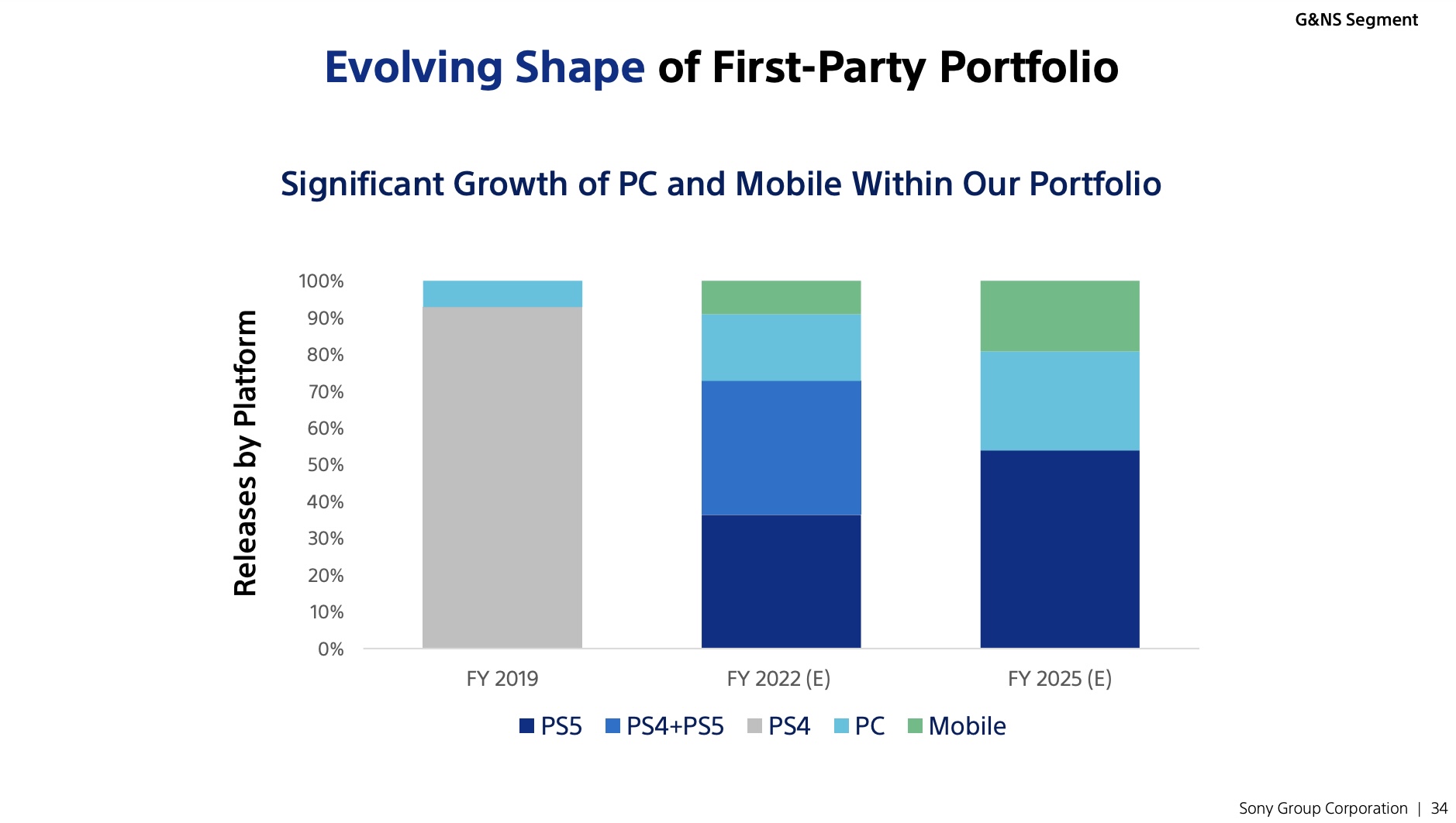
Image Credits: Sony (opens in a new window)
Utilities
- Google celebrated 15 years of Street View with a new camera and a time travel feature on Google Maps for iOS and Android that lets you view historical imagery going all the way back to 2007.
- Apple rolled out its immersive walking directions feature for Apple Maps in the city of Tokyo. The feature offers step-by-step walking guidance in augmented reality. Users simply raise their iPhone to scan buildings in the area, and Maps then generates a highly accurate position to deliver directions.
- Maryland residents are now able to store their driver license or state ID in the Apple Wallet app. The state is now the second in the U.S. to support the new feature, following the launch in Arizona in March.
Government, policy and… antitrust lawsuits
- Match Group and Google reached an interim compromise over app payments. Match agreed to withdraw its request for a temporary restraining order and put up to $40 million aside in escrow in lieu of making payments directly to Google while its antitrust lawsuit over app store fees is decided.
- Epic Games and Google also reached a similar agreement over Epic’s Bandcamp. The company had filed an injunction asking for the right to allow Bandcamp to continue operating as usual instead of being forced to adopt Google’s own payments system as is now required via a policy change, or risk expulsion from the Google Play Store. Bandcamp agreed to place 10% of its revenue into escrow until Epic Games’ larger antitrust lawsuit with Google is decided.
- In a new court filing, Epic Games challenged Apple’s position that third-party app stores would compromise the iPhone’s security. It points to Apple’s macOS as an example of how the process of “sideloading” apps — installing apps outside of Apple’s own App Store, that is — doesn’t have to be the threat Apple describes it to be. Apple’s Mac, explains Epic, doesn’t have the same constraints as found in the iPhone operating system, iOS, and yet Apple touts the operating system used in Mac computers, macOS, as secure.
- Apple again criticized the impact of allowing sideloading on iOS devices, following U.S. Sen. Amy Klobuchar’s introduction of an updated version of the American Choice and Innovation Act aimed to address lawmaker and tech industry concerns over the original. Said Apple, the changes weren’t enough and will “undermine the privacy and security protections” its users depend on.
Security & Privacy
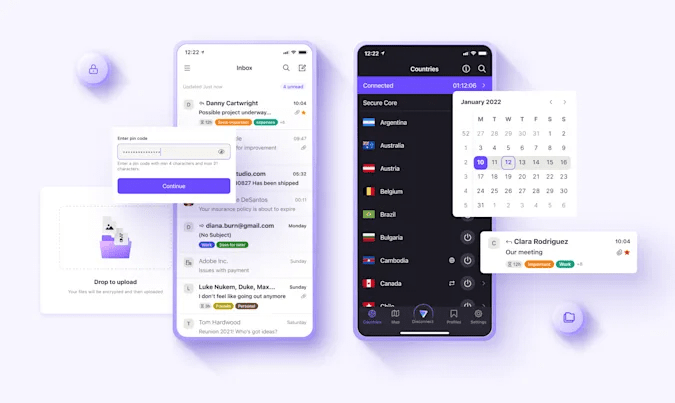
Image Credits: Proton
- Encrypted email provider ProtonMail, makers of a popular iOS mail app, rebranded as just “Proton” as it works to combine services including Proton VPN, Proton Calendar and Proton Drive under one roof.
- DuckDuckGo confirmed a researcher’s findings which indicated its browser allows some Microsoft trackers on third-party sites. The company said this was due to a Microsoft search content agreement, which had been previously undisclosed. The company defended itself on Hacker News, saying that the deal was “just about non-DuckDuckGo and non-Microsoft sites in our browsers, where our search syndication agreement currently prevents us from stopping Microsoft-owned scripts from loading.” It noted DuckDuckGo can still apply its browser’s protections post-load — like third-party cookie blocking and others. The company operates browsing apps for Mac, iOS and Android.
- Brave Software, the company behind the cross-platform privacy-focused Brave browser, extended its partnership with Guardian, makers of Guardian Firewall + VPN. The deal will integrate Brave Firewall + VPN, powered by Guardian, into the Brave Android app. The move follows the Firewall + VPN for the Brave iPhone and iPad browser apps.
- A study by Human Rights Watch found that 89% of 164 remote learning apps and sites used during the pandemic across 49 countries had shared student data with marketers and data brokers.
🤝 Take-Two completed its $12.7 billion acquisition of mobile games giant Zynga. The deal saw Zynga shareholders receive $3.50 in cash and 0.0406 shares of Take-Two common stock per share of Zynga common stock.
💰 AR mobile game maker Jadu raised $36 million in a Series A round led by Bain Capital Crypto to accelerate its work building out an AR game featuring 3D NFT avatars from Deadfellaz, CyberKongz, FLUFs, VOIDs, ChibiApes, Meebits and other collections. The company has raised $45 million+ to date.
💰 Friendly Apps just closed on a $3 million seed round, pre-product, from BoxGroup, Weekend Fund, Shrug Capital, Day One Ventures, Betaworks Ventures, SRB Ventures, 305 Ventures, CoreVentures and other angels. The startup hails from longtime engineer and product designer Michael Sayman, who has been building apps since he was a kid, landing him roles at Facebook, Google, Roblox, and, most recently, Twitter. Having joined Facebook at just 17, he’s often been tasked with developing products aimed at a teenage audience. Now he’s planning to leverage his understanding of what users want from their apps with his own startup.
💰 Circles, an app that offers online group therapy via video chat, raised $16.5 million in a Series A round led by Zeev Ventures. Also participating was Lior Ron, head of Uber Freight, along with existing investors NFX, Flint Capital and Sir Ronald Cohen.
💰 Pokémon GO maker Niantic disclosed its first two investments. The company said it has backed TRIPP, an award-winning leader in XR wellness, and music metaverse startup Pixelynx, from musicians deadmau5 and Plastikman. The latter’s first mobile game is called Elynxir and is using Niantic’s new Lightship AR platform to combine musical experiences and AR. Deal terms weren’t disclosed.


